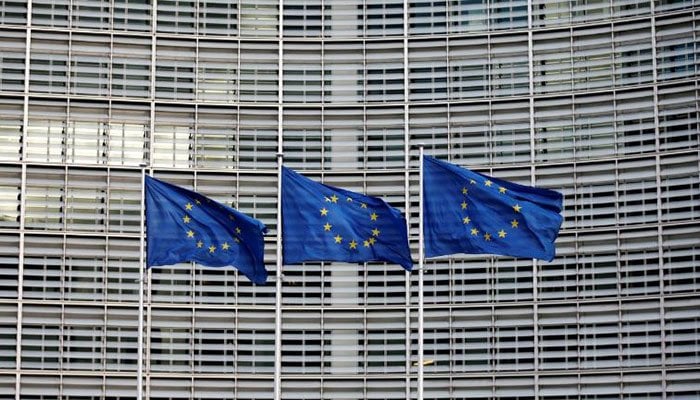Pakistan may face GSP+ suspension if human rights conditions not met: EU
Stark warning given to Pakistan, country asked to meet ILO, EU and UN human rights conditions
July 08, 2021

- Pakistan may face temporary suspension of its GSP+ status.
- European Commission takes note of resolution adopted by European Parliament in April which had called for a review of Pakistan’s eligibility for the Generalised Scheme of Preferences Plus status
- Resolution had cited an increase in laws that it saw as discriminatory towards minorities and fundamental rights in Pakistan.
BRUSSELS/STRASBOURG: Pakistan’s GSP Plus (GSP+) status can be suspended temporarily if it doesn’t comply with the human rights conditions attached to it, European Commission trade spokesperson Miriam Garcia Ferrer has told Geo News.
The spokesperson was responding in reference to a resolution adopted by the European Parliament in April, which had called for a review of Pakistan’s eligibility for the GSP+ status after citing an increase in laws that it saw as discriminatory towards minorities and fundamental rights.
"A temporary withdrawal of the GSP+ status is believed to be the last resort when all other means of political dialogue and engagement do not produce necessary results," she added. It bears mentioning that a final decision has not been taken on the matter yet.
"The EU continues to engage with the Government of Pakistan to ensure compliance by Pakistan of its international commitments, in particular in the area of human rights," the spokesperson said.
Read more: EU parliament wants Pakistan's GSP plus status reviewed
The GSP+ is a special component of the GSP scheme that provides additional trade incentives to developing countries already benefitting from GSP.
The GSP+ status granted to Pakistan requires the country to demonstrate progress on the implementation of 27 international core conventions. This condition constitutes a strong leverage for the European Union in terms of monitoring any direct advocacy with Pakistan.
The European Commission and European External Action Service (EEAS) has since been closely monitoring political developments in Pakistan with respect to the relevant UN/International Labour Organization (ILO) Conventions, including the issues raised in the resolution.
Read more: EU gives Pakistan favourable review for GSP+ status
Meanwhile, the European Parliament's Human Rights and Foreign Affairs committees at the Strasbourg plenary session have recommended amendments to the global human rights sanctions regime legislation, also known as the Magnitsky Act, to make it more forceful.
The amendments recommend that resolutions passed against human rights violations be passed by a majority vote rather than unanimously, and instead of imposing sanctions on countries that violate human rights under the Magnitsky Act, sanctions will be imposed on rulers instead.
Such sanctions may include bans on their travel to Europe, as well as seizure of their assets in Europe and freezing of bank accounts.
This story has been revised after publishing for the purposes of clarity.











